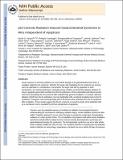p53 Controls Radiation-Induced Gastrointestinal Syndrome in Mice Independent of Apoptosis
Author(s)
Kirsch, David G.; Santiago, Philip M.; di Tomaso, Emmanuelle; Sullivan, Julie M.; Hou, Wu-Shiun; Dayton, Talya Lucia; Jeffords, Laura B.; Sodha, Pooja; Mercer, Kim L.; Cohen, Rhianna; Takeuchi, Osamu; Korsmeyer, Stanley J.; Bronson, Roderick T.; Kim, Carla F.; Haigis, Kevin M.; Jain, Rakesh K.; Jacks, Tyler E; ... Show more Show less
DownloadJacks_p53 controls.pdf (1.380Mb)
PUBLISHER_POLICY
Publisher Policy
Article is made available in accordance with the publisher's policy and may be subject to US copyright law. Please refer to the publisher's site for terms of use.
Terms of use
Metadata
Show full item recordAbstract
Acute exposure to ionizing radiation can cause lethal damage to the gastrointestinal (GI) tract, a condition called the GI syndrome. Whether the target cells affected by radiation to cause the GI syndrome are derived from the epithelium or endothelium and whether the target cells die by apoptosis or other mechanisms are controversial issues. Studying mouse models, we found that selective deletion of the proapoptotic genes Bak1 and Bax from the GI epithelium or from endothelial cells did not protect mice from developing the GI syndrome after sub–total-body gamma irradiation. In contrast, selective deletion of p53 from the GI epithelium, but not from endothelial cells, sensitized irradiated mice to the GI syndrome. Transgenic mice overexpressing p53 in all tissues were protected from the GI syndrome after irradiation. These results suggest that the GI syndrome is caused by the death of GI epithelial cells and that these epithelial cells die by a mechanism that is regulated by p53 but independent of apoptosis.
Date issued
2009-12Department
Massachusetts Institute of Technology. Department of Biology; Koch Institute for Integrative Cancer Research at MITJournal
Science
Publisher
American Association for the Advancement of Science (AAAS)
Citation
Kirsch, D. G., P. M. Santiago, E. di Tomaso, J. M. Sullivan, W.-S. Hou, T. Dayton, L. B. Jeffords, et al. “p53 Controls Radiation-Induced Gastrointestinal Syndrome in Mice Independent of Apoptosis.” Science 327, no. 5965 (January 28, 2010): 593-596.
Version: Author's final manuscript
ISSN
0036-8075
1095-9203